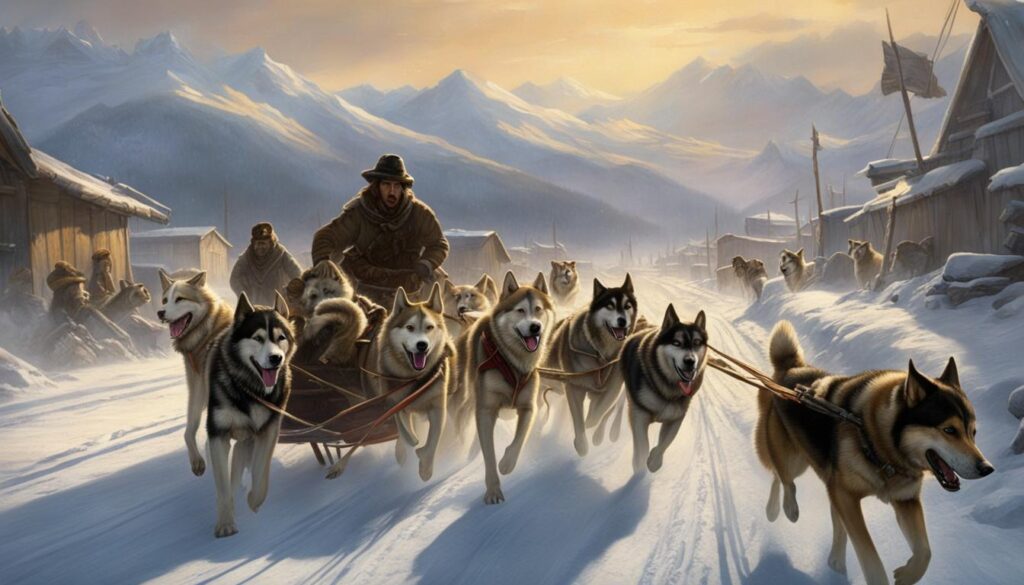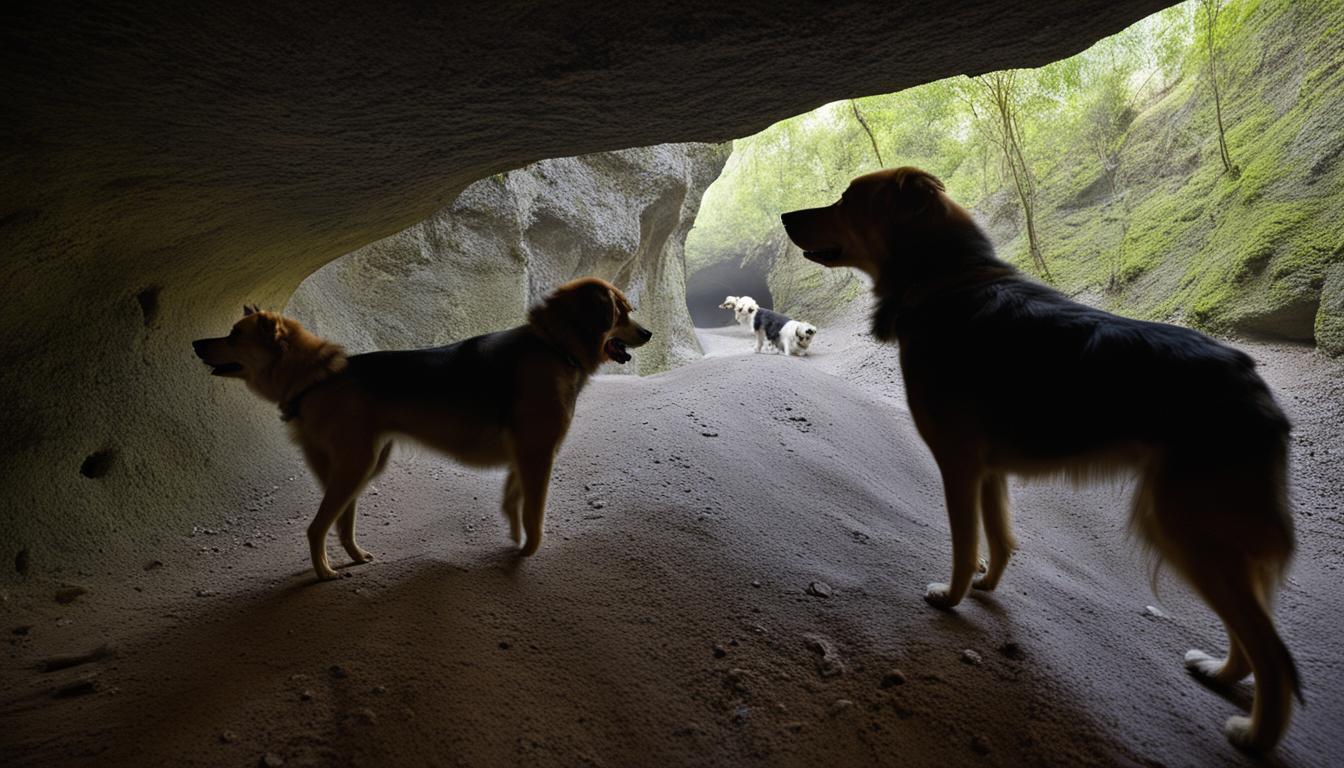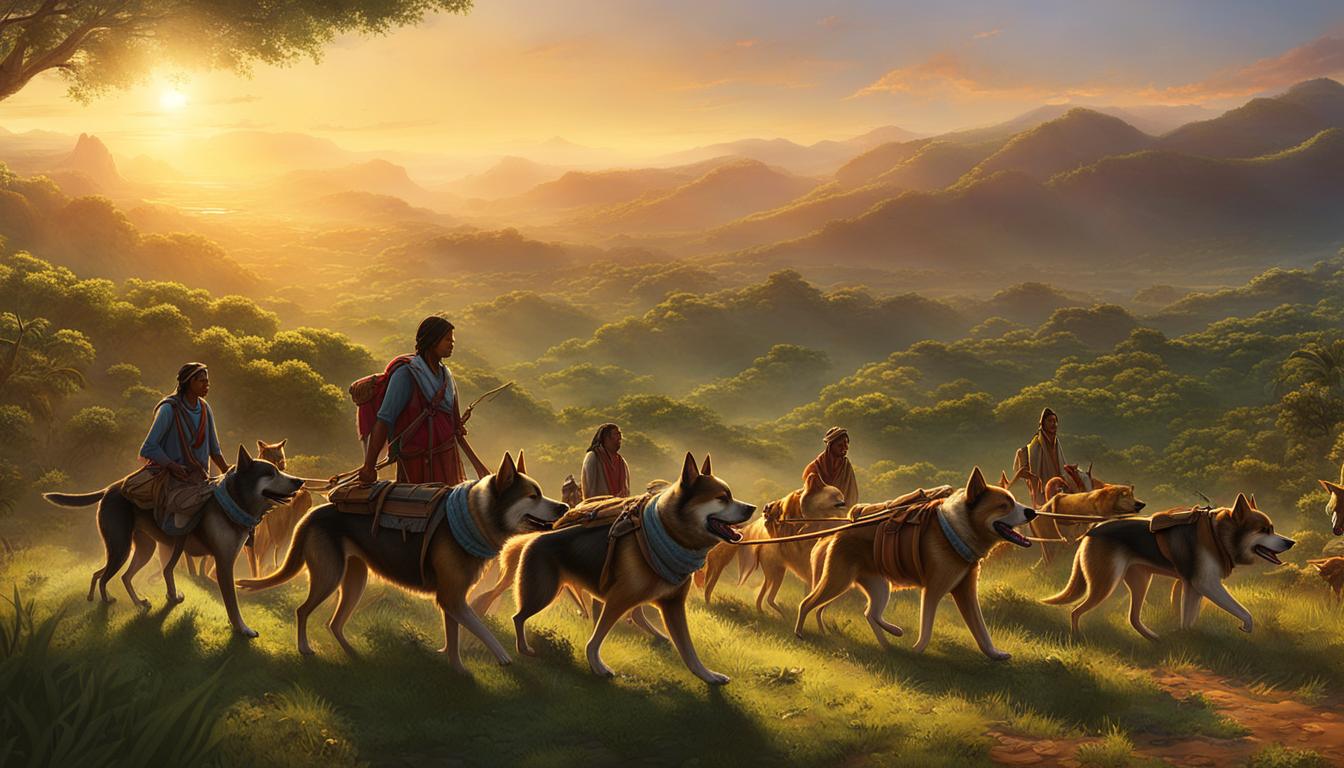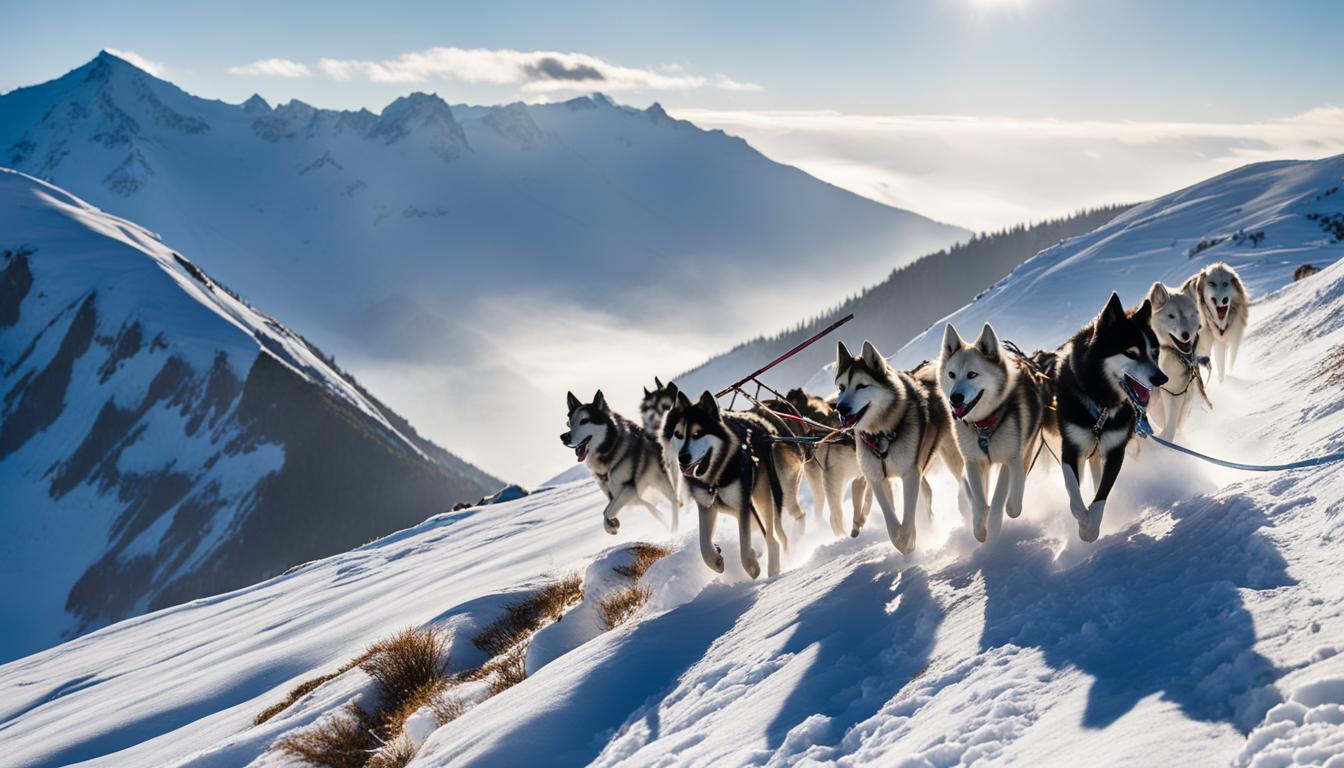Welcome to a fascinating journey through history where we uncover the remarkable role played by dogs in shaping historic trade routes. These loyal and intelligent creatures were not just mere companions, but strategic guides and protectors on trade journeys, ensuring the success of expeditions that paved the way for civilizations to thrive.
Key Takeaways:
- Dogs played a significant role in historic trade routes, serving as faithful companions and guides to caravans.
- They aided in the transportation of goods and ensured the success of trade expeditions.
- By accompanying merchants along the Silk Road, dogs served as protectors, guardians, and guides, ensuring the safe passage of valuable trade goods.
- Dogs played a crucial role as protectors in overland trade caravans, guarding the goods against theft and providing security to merchants.
- These canines accompanied explorers and traders, providing companionship and assistance in navigating unknown territories and discovering new trade routes.
Dogs in Silk Road Expeditions
The Silk Road, one of the most influential trading routes in ancient times, witnessed the remarkable contributions of dogs. These loyal companions played an indispensable role in ensuring the success and safety of the expeditions along this historic path.
Dogs accompanied merchants as they traversed vast distances, guarding them and their precious trade goods against potential threats. Their keen senses and fierce loyalty made them excellent protectors, deterring potential thieves and ensuring the security of valuable cargo. With their vigilant presence, dogs instilled confidence in merchants, allowing them to navigate treacherous terrains and unpredictable conditions with peace of mind.
Not only did dogs provide protection, but they also served as knowledgeable guides. These four-legged navigators had an unparalleled familiarity with the ancient trading paths, enabling them to lead caravans through unfamiliar territories. Their keen sense of direction and intuition guided merchants to their destinations, ensuring a smooth journey and successful trade exchanges.
“Dogs have proven to be indispensable companions along the Silk Road. Their unwavering loyalty and remarkable abilities have shaped the course of history,” says Dr. Li Mei, a renowned historian specializing in ancient trade routes.
Whether guiding caravans, protecting merchants, or fostering trust between different regions, dogs left an indelible mark on the Silk Road expeditions. Their historical impact on trade routes cannot be underestimated, as they played a pivotal role in facilitating the exchange of goods, ideas, and cultures between distant civilizations.
| The Ancient Canine | |
|---|---|
| Ancient Trade Paths | Dogs played a significant role in ancient trading routes, particularly the Silk Road. |
| Historical Impact | The presence of dogs ensured the safety and success of trade expeditions, shaping the course of history. |
| Old Trade Expeditions | Dogs served as protectors, guardians, and guides, aiding merchants in their perilous journeys. |
Canines as Protectors: Dogs Aiding Merchants on Overland Routes
Throughout history, dogs have played a crucial role as protectors in overland trade caravans. These loyal companions were more than just animals; they were vital members of the merchant teams, offering their unwavering loyalty, bravery, and keen senses to safeguard goods and ensure the safety of the merchants themselves during long and perilous journeys.
As the ancient overland routes connected different regions and cultures, traders faced numerous challenges, including the threat of theft and attacks from bandits. Dogs, with their acute hearing and sharp instincts, were highly effective in detecting and deterring potential dangers. Their mere presence served as a powerful deterrent, dissuading potential thieves and maintaining a sense of security among the caravan members.
Beyond their protective instincts, canines proved invaluable in navigating the treacherous terrains encountered along the trade routes. Their familiarity with the routes, acquired through previous journeys, allowed them to guide the caravans, leading the way through rugged landscapes and ensuring the safe and efficient movement of goods.
In addition to their protective and guiding roles, dogs also provided much-needed companionship to the merchants. The long and often solitary journeys were made less lonely by the presence of these faithful animals, offering comfort, support, and a sense of camaraderie. Their unwavering loyalty and affection created a bond that extended beyond their functional duties, bringing solace and joy to the merchants as they traversed vast distances.
As we delve into the fascinating history of ancient trade, it becomes clear that canines played an indispensable role as protectors in overland trade caravans. Their vigilance, guidance, and companionship contributed to the successful completion of trade expeditions, ensuring the safe arrival of goods and fostering the growth of intercultural exchange and economic development.

The Role of Dogs in Protecting Overland Trade Caravans
| Protection | Guidance | Companionship | |
|---|---|---|---|
| Advantages | • Deterred theft and attacks • Enhanced security for caravans |
• Familiarity with trade routes • Navigated rugged terrains |
• Provided comfort and support • Eased loneliness during journeys |
| Benefits | • Reduced risk of loss and damage to goods • Maintained merchant safety |
• Efficient and safe transport of goods • Expedited trade expeditions |
• Boosted morale and well-being of merchants • Strengthened bonds within caravan teams |
Dogs and the Expansion of Civilization: The Role of Canines in Trade Exploration
Dogs have played an integral role in the expansion of civilization through their involvement in trade exploration. These loyal companions accompanied explorers and traders on their expeditions, providing invaluable assistance in navigating unknown territories and discovering new trade routes. The historical impact of dogs on trade routes, particularly along the Silk Road, cannot be overstated.
During ancient trade exploration, dogs served as faithful guides and guardians, leading the way for merchants and ensuring their safety during perilous journeys. Their acute sense of smell and hearing allowed them to detect potential dangers, such as wild animals or hostile tribes, before they posed a threat. This early warning system provided a significant advantage for traders, allowing them to navigate unfamiliar terrain with confidence.
Furthermore, dogs facilitated cultural exchanges during trade exploration. As they accompanied traders on their journeys, they became conduits for the exchange of goods, ideas, and customs between different regions and cultures. Through their interactions with locals along the trade routes, dogs helped bridge language and cultural barriers, fostering mutual understanding and facilitating the spread of ideas and innovations.
The Canine Roles in Silk Road Expeditions
The Silk Road, one of the most important and influential trade routes in human history, owes much of its success to the canine companions that accompanied traders on their expeditions. These dogs not only provided protection and guidance but also served as symbols of trust and cooperation between different civilizations. Their presence helped to establish trade networks, connecting distant regions and enabling the exchange of valuable goods and knowledge.
| Canine Role | Significance |
|---|---|
| Protectors | Guarded merchants and their goods against theft and provided security during dangerous journeys. |
| Guides | Navigated traders through challenging terrain, ensuring the success of their expeditions. |
| Companions | Provided emotional support to traders, alleviating loneliness and boosting morale during long and arduous journeys. |
Their involvement in trade exploration not only influenced the economic development of civilizations but also contributed to the exchange of ideas and cultural enrichment. Dogs truly played a pivotal role in shaping history through their instrumental participation in historic overland routes.

In summary, dogs have left an indelible mark on trade exploration, ancient overland routes, and the expansion of civilization. Their unwavering companionship, protection, and guidance have shaped history and influenced the development of trade networks and cultural exchanges. The significance of dogs in historic trade routes, particularly their roles in Silk Road expeditions and ancient trade exploration, cannot be understated.
Dogs in the Development of Trade Networks: Canines as Guides and Companions
Throughout history, dogs have played a crucial role in the development of trade networks as trusted guides and companions on trade journeys. From ancient times to historic expeditions, these loyal canines have aided in the establishment of trade routes and facilitated communication between different regions and cultures.
Canines as Guides
Dogs have long been relied upon as expert guides, leading caravans through unfamiliar terrain and ensuring the safe passage of trade goods. With their keen sense of smell and excellent navigation skills, these canine companions have guided traders along historic trade routes, such as the Silk Road and other overland paths.
In addition to their innate ability to navigate, dogs have also served as reliable guides for traders in establishing communication and trust with local communities. Their presence has helped bridge cultural gaps and fostered relationships between traders from different regions, contributing to the development of extensive trade networks.
Canine Companions on Trade Journeys
Beyond their role as guides, dogs have provided companionship and emotional support to traders during their arduous journeys. The long and often treacherous expeditions required courage and resilience, and these loyal canines offered comfort and a sense of security to their human companions.
Furthermore, the presence of dogs on trade journeys provided a sense of familiarity and home for the traders. In unfamiliar territories, the companionship of these canines helped alleviate feelings of loneliness and isolation, fostering a positive environment for trade and cultural exchange.
| Purpose | Dogs in History | Impact |
|---|---|---|
| Guiding caravans | Trusted companions with excellent navigation skills | Ensured safe passage of trade goods and establishment of trade routes |
| Establishing communication | Facilitated trust and communication between traders and local communities | Fostered the development of extensive trade networks |
| Providing companionship | Offered emotional support and comfort to traders during long journeys | Alleviated feelings of loneliness and contributed to a positive trade environment |
In conclusion, dogs have played a vital role in the development of trade networks throughout history. As guides and companions, they have helped traders navigate unfamiliar territories, establish communication and trust, and foster cultural exchange. Their invaluable contributions have shaped historic trade routes, ensuring the success of trade expeditions and the expansion of civilization.

| Trade Route | Role of Dogs |
|---|---|
| Silk Road | Dogs served as protectors, guardians, and guides, ensuring the safe passage of goods and facilitating cultural exchange. |
| Ancient Trade Routes | Dogs accompanied merchants, providing security and companionship, while also fostering the transfer of ideas and customs. |
| Overland Exploration Routes | Dogs assisted explorers in navigating unfamiliar territories, helping them discover new trade routes and facilitating cultural exchange. |
Conclusion
Dogs have left an indelible mark on historic overland routes. Through their unwavering companionship, protection, and guidance, these canines have played a significant role in shaping history. From the ancient Silk Road expeditions to aiding merchants on trade journeys, dogs have been instrumental in the success of historic trade routes.
Their involvement in trade and exploration expeditions has contributed to the development of trade networks and the exchange of goods and ideas. These furry companions have not only assisted in the transportation of valuable trade goods but have also acted as catalysts for cultural exchange between different regions and cultures.
Their loyalty and service have truly shaped history. As faithful guides and protectors, dogs have helped traders navigate unknown territories, discover new trade routes, and ensure the safe passage of goods over vast distances. Their impact on historic overland routes is undeniable, and they have truly earned their place in the annals of trade history.
FAQ
How did dogs play a role in historic trade routes?
Dogs served as faithful companions and guides to caravans, aiding in the transportation of goods and ensuring the success of trade expeditions.
What was the significance of dogs on the Silk Road?
Dogs were instrumental in the expeditions along the Silk Road, serving as protectors, guardians, and guides for merchants, ensuring the safe passage of valuable trade goods.
What was the role of dogs in overland trade caravans?
Dogs played a crucial role as protectors in overland trade caravans, guarding goods against theft and providing security to merchants during long and dangerous journeys.
How did dogs contribute to the expansion of civilization through trade exploration?
Dogs accompanied explorers and traders, providing companionship and assistance in navigating unknown territories and discovering new trade routes.
How did dogs assist in developing trade networks?
Dogs served as guides and companions on trade journeys, aiding in navigating unfamiliar terrain and establishing communication and trust between traders from different regions.
How did dogs facilitate cultural exchange along historic overland routes?
Dogs accompanied traders on their journeys, facilitating the exchange of goods and acting as catalysts for the exchange of ideas, customs, and traditions between different regions and cultures.
What impact did dogs have on historic overland routes?
Dogs left an indelible mark on historic overland routes through their unwavering companionship, protection, and guidance, contributing to the development of trade networks, the exchange of goods and ideas, and the expansion of civilization.





